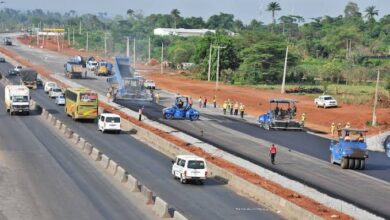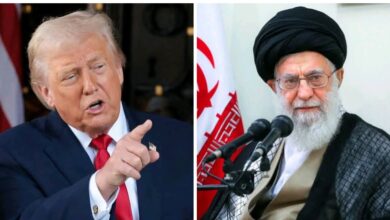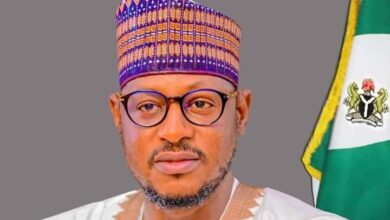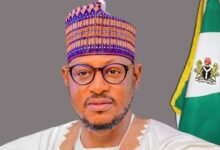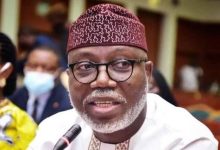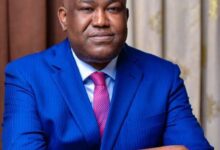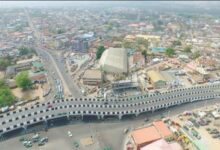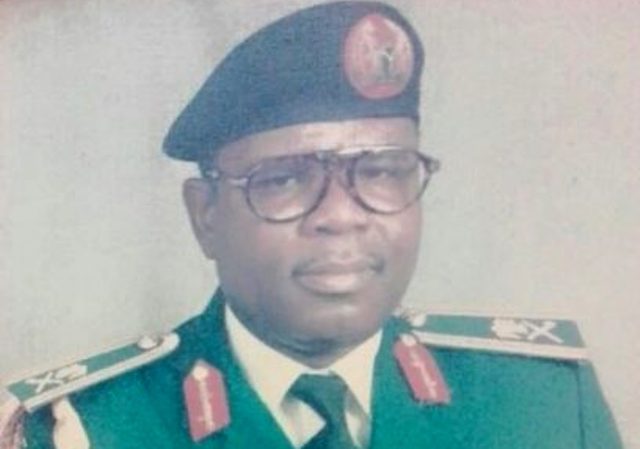
By Bashir Adefaka
“President Muhammadu Buhari is a man known for supporting the truth and a man whose leadership established on equity and justice. He should add more feathers to his cap by pardoning General Tajudeen Olanrewaju, who is one of his successors as General Officer Commanding (GOC) 3rd Amoured Division of the Nigerian Army, Jos, former Minister of Communications of the Federal Republic of Nigeria with track record of how he deregulated and expanded the telecommunications sector into what Private Telecoms Operators (PTOs) and internet owners were able to come in and invest, and it was he that single-handedly upped Lagos State from 12-Local Government to 20-Local Government structure and he was a Member of the Provisional Ruling Council (PRC) during the Administration of late General Sani Alhaji Abacha, GCFR.”
I wish to advise President Muhammadu Buhari to revisit one singular advice that I, as an ardent supporter of him, have always given in most of my writings either on the social media (Facebook) or as published in works in the traditional media. That he should correct the hanky-panky, the selective justice done by PDP’s Goodluck Ebele Jonathan’s pardon of officers involved in the Lieutenant General Oladipo Diya’s group of alleged fathomed coup of 1997 and do the needful. Agreed, presidential pardon is prerogative responsibility of the President. If Jonathan had exercised his own to do selective justice thereby leaving some people in the cold and protracted sadness, President Buhari should use his to right the wrong and make more friends for himself.
It will be recalled that at Oputa Panel and the military courts earlier, General Tajudeen Olanrewaju’s only offence was spelt out to be that he had a hint of the alleged coup by Diya but that he did not report to the authorities. The brilliant fine officer that is an Awori Prince of Lagos State never denied that. The cause of his silence remains what we later in life were able to position as “loyalty being put to test in a very difficult situation”. The reason he advanced not withstanding at the level of this write-up, although it may be pertinent to mention that at Olanrewaju’s 60th birthday some 12 years ago, General Diya himself confessed openly in the presence of other retired Generals like Tunji Oluri and many others that “I am very happy today to congratulate Olanrewaju because if Abacha had killed him, he would have died because of Diya and if Diya had been killed, he would have died for Yoruba race. Because that time I told Olanrewaju about the coup, he had two options and powers: One was to round all of us up and kill us by himself and two was for him to go straight and report me to Abacha.” He did not talk more than that.
Personally investigating to know more about that statement by Diya, and I have interviewed him about three times now one before his pardon by Jonathan and the other two after his pardon, it was revealed to me that, General Olanrewaju never believed in the racist coup being plotted by Diya but that he was torn between the Sea and the Devil: Abacha was the Sea and Diya was the Devil. Olanrewaju had been – and even up till today – is one General, serving or retired, that never believed in racist or tribal politics. For that reason, he could not have been involved in the Diya’s claim of “Diya would have died for Yoruba race”. Yes, the Diya’s claim that “Olanrewaju would have died for Diya” if Abacha had killed him was correct and understandable in the sense that Diya put him in tight corner from where he found it difficult to save himself and from all indications, although he does not like to talk about it, the Lagos born former Minister of Communications continues to find it as the most regrettable thing of his life till today.
A family source who has access to inner thought of the former Acting Military Governor of Old Ondo State said, “What Bo’da (Brother) actually passed through is caused by Diya. He had the ears of Abacha and Abacha so much loved and trusted him so much that not all officers in power had the privileges that he enjoyed during the Abacha era. Diya caused it when he told him, ‘Olanrewaju, I am planning a coup but ‘pami sile mapami sita’ (meaning, give me cover as blood brother). It was the time Yoruba people under Afenifere saw Diya as their own son being persecuted by Abacha government. Bo’da accepted his fate of ending era this way, ‘If I do anything now against Diya, the Yoruba race where I come from will accuse me of plotting evil to fellow Yoruba in the same government especially when they don’t even believe Diya ever plotted the coup. If eventually after reporting him and it is being said that Abacha was going to make me Second-in-Command, Chief of General Staff, the Yoruba will say a Yoruba is envying his fellow Yoruba man in power. This, let me be frank with you, was the major problem. Bo’da never plotted coup with Diya, although at the point that he made up his mind and wanted to tell Abacha, those who went to misrepresent him to the Head of State had come to arrest him,” the family source gave the very highly pathetic revelation that has continued to make the fine General so sad with himself till today.
Implications of the Diya’s confession are these: General Diya, there is no longer need for me to hide this fact, put Olanrewaju in tight corner during the time he was having his free days to unseat Abacha. It is great to know today that even Lieutenant General Ishaya Bamaiyi, former Chief of Army Staff during the time, exonerated Olanrewaju in his recent book, which excluded him in all the meetings he had with Diya plotting the alleged coup. Although, some of the places he said that he (Bamaiyi) had gone with him had been refuted in a press statement that was the first to counter some misrepresentations in the book.
General Tajudeen Olanrewaju’s case is therefore no difference from the case of General Olusegun Obasanjo, who, in his own case, was not only informed and refused to report the Musa Gwadabe’s coup to the authorities but also was said to have indicated interest but put them on hold to let him travel and return. But the same Obasanjo, not only he was pardoned by the few Owners of Nigeria who formed themselves into the controlling powers of the then PDP but also, was made Presidential Candidate of the party and given all the support (by fire or crook) to emerge as President and Commander-in-Chief of the Federal Republic of Nigeria.
For the eight years of Obasanjo in power, many approaches were made by even Olanrewaju himself either in Abuja or in Abeokuta for him to consider the matter and give pardon to him and others including Diya. Obasanjo refused to grant those pleas because of his passionate hatred for Diya. While Obasanjo was in prison, he had been informed about alleged obscure relationship between Diya and his wife of blessed memory and it was because of involvement of one person in a group of many officers that Obasanjo refused to pardon them like he was pardoned by General Abdulsalami Abubakar’s government. Not even the pleas coming from others like former Commandant of the Nigerian Army School of Military Police, now late Colonel Olu Craig, entered the good side of the former President’s ears. He refused to grant them pardon because of Diya, his own Ogun State man.
Obasanjo left and Alhaji Umar Musa Yar’Adua came on board. He was also approached. In his own case he did the necessary presidential processing required, remaining for Attorney-General of the Federation and Minister of Justice to implement. But Yar’Adua died! Innalillahi waina ilayhi rojiuun! May Allah continue to keep and repose the gentle soul of the late President in Al-Jannah. Amin.
After Yar’Adua came Goodluck Ebele Jonathan. Jonathan knew about the outstanding arrangement by his late boss, Yar’Adua, to pardon those retired Generals. He dragged on it until Prince Bola Ajibola (SAN) took a swipe on him for calling Diepreye Alaiyemeseigha his political godfather and he needed to clear his political father with misconceived pardon for a man who not only jumped bail in the United Kingdom but also served jail terms in Nigeria on issue of corruption. Baba Ajibola had turned down an interview question by me and preferred to simply speak on what he described as “insulting to the entire people of Nigeria for our President to call an ex-convict in Alaiyemeseigha his political father”.
In my off camera analysis I made it clear somewhere that President Jonathan would be jolted by the Bola Ajibola’s challenge put together by me and published in an edition of Sunday Vanguard at that time and that he would therefore want to free Alaiyemeseigha of his “ex-convict” status and that he had got opportunity to do that. Asked how? I said, “There is an outstanding pardon for some retired Generals which Jonathan has dragged foot upon. He will now want to reopen the pardon by slotting in the name of Alaiyemeseigha to enable his pardon fly.” That was exactly what he did but in doing it, he removed General Tajudeen Olanrewaju’s name and the names of two other officers from the list. The rest is now history.
I however gathered that some Lagos political elites, intimidated by Olanrewaju’s charisma and wide popularity among the people, were responsible for what Jonathan did. General Olanrewaju is a very selfless person that has been creator of opportunities. He is one of few Generals around who years after service either as Army officer or government office holder remains so contented without pressure or fear of EFCC or ICPC. He also is an embodiment of respect, whose loyalty to constituted authorities is excellent. It will be recalled how he was the only one spending for his party while he was active member of People’s Democratic Party (PDP). His typical nature of an enigmatic, pragmatic patriot of full discipline makes him loved across the parties.
President Muhammadu Buhari is a man known for supporting the truth and a man whose leadership established on equity and justice. He should add more feathers to his cap by pardoning General Tajudeen Olanrewaju, who is one of his successors as General Officer Commanding (GOC) 3rd Amoured Division of the Nigerian Army, Jos, former Minister of Communications of the Federal Republic of Nigeria with track record of how he deregulated and expanded the telecommunications sector into what Private Telecoms Operators (PTOs) and internet owners were able to come in and invest, and it was he that single-handedly upped Lagos State from 12-Local Government to 20-Local Government structure and he was a Member of the Provisional Ruling Council (PRC) during the Administration of late General Sani Alhaji Abacha, GCFR.
*Bashir Adefaka, a Prince of Isolo, Akure, Ondo State, is a Lagos-based media practitioner.



